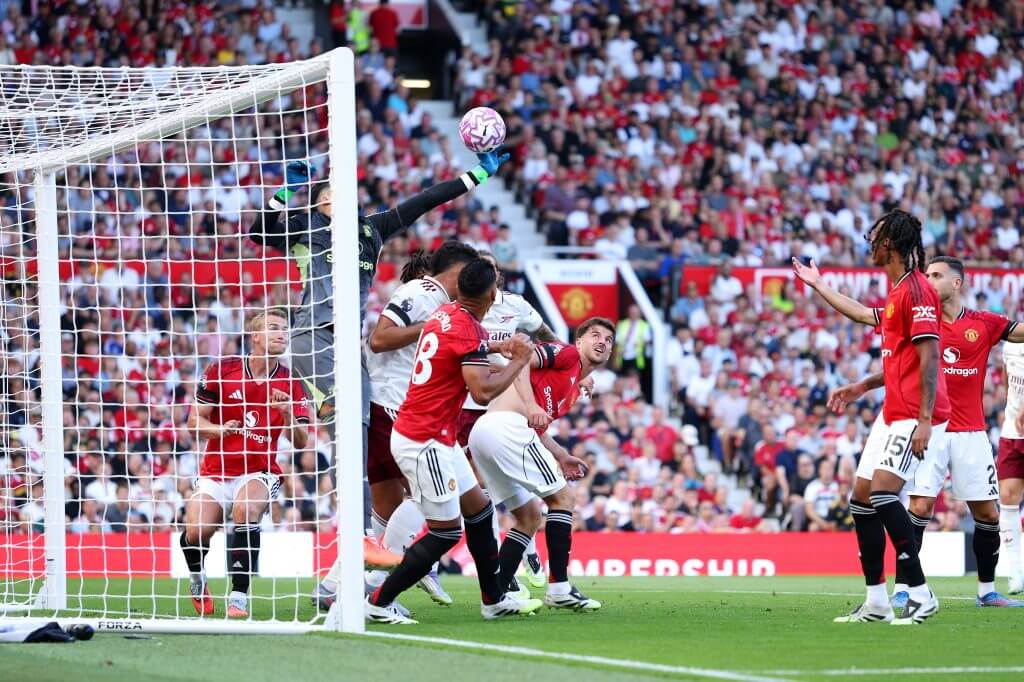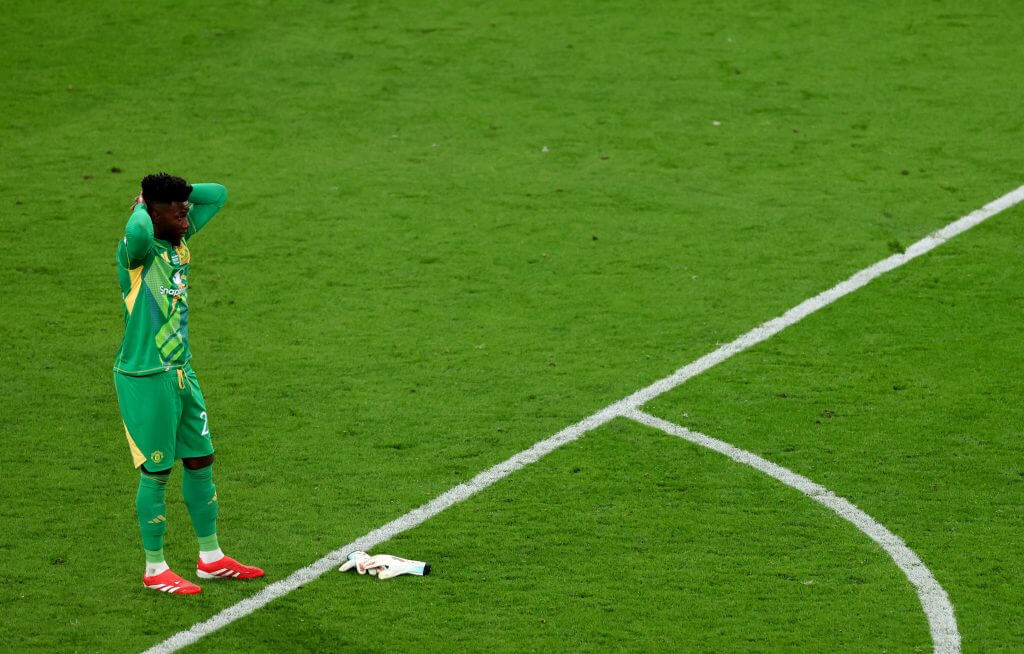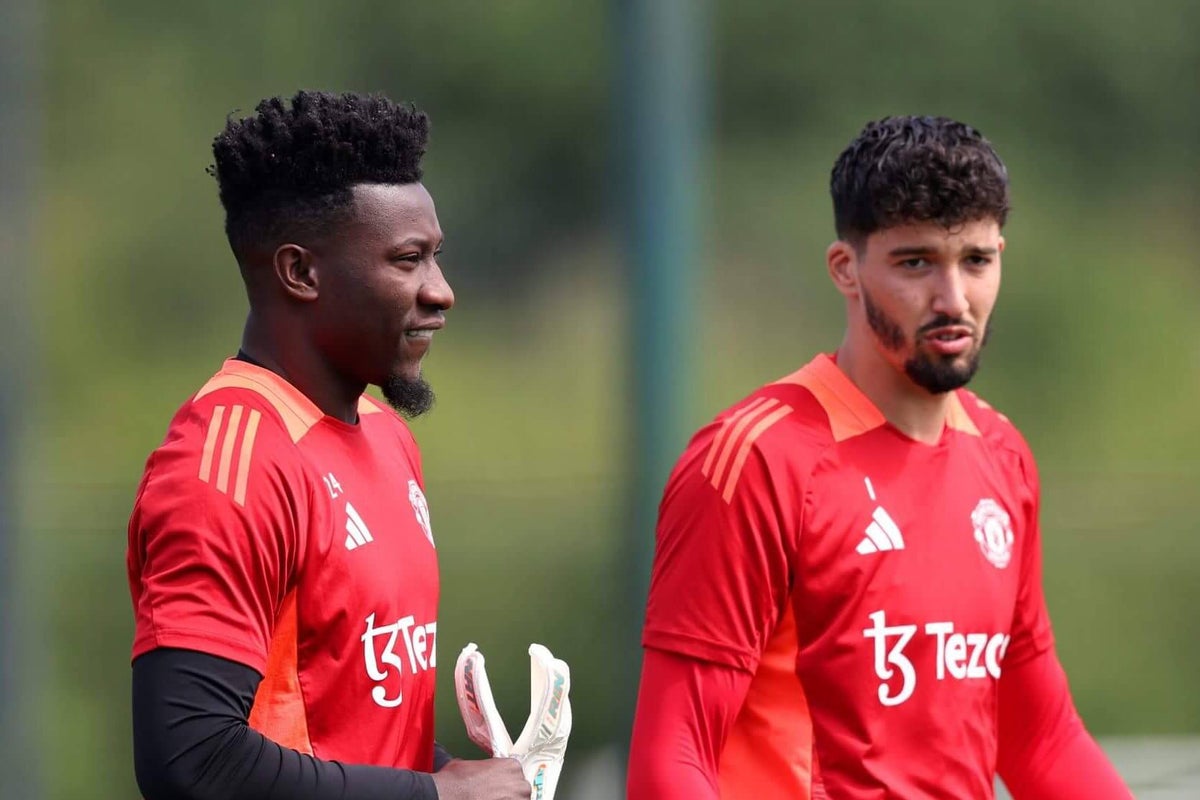Ruben Amorim furrowed his brow in complete bewilderment.
Following Manchester United’s 1-0 defeat by Arsenal, in which Altay Bayindir failed to deal with Declan Rice’s corner, a journalist asked if he had considered starting third-choice goalkeeper Tom Heaton instead of Bayindir.
“Why?” replied Amorim before defending Bayindir to the hilt, describing him as “unbelievable” when United eliminated Arsenal in the FA Cup third round on penalties last season. “I considered everything to put one or the other and I choose Altay,” he said.
Amorim confirmed before the game that Andre Onana had “recovered” from his hamstring injury, which forced him to miss pre-season, and added afterwards that he did not drop Onana. “It’s (about) not putting Onana with just one week, without seeing a game, without time training,” said Amorim.
Even when Onana returns to the matchday squad, there are questions around United’s goalkeeping situation. Onana has lacked consistency, while the more inexperienced Bayindir has, in moments, lacked quality.
“It’s clear that Onana has gone from excellent to less excellent to doubtful,” says former goalkeeper Frans Hoek, founder of Goalplayer and assistant, specialising in goalkeeping and set pieces, under former Manchester United manager Louis van Gaal from 2014 to 2016.
“At the moment, it’s a very unsure situation. You always need balance in a goalkeeping unit because anything can happen.”
While Onana is returning to full match fitness, the problem, according to former professional goalkeeper and now The Athletic analyst, Matt Pyzdrowski, is that Bayindir is “not good enough”.

Bayindir struggled against Arsenal (Michael Regan/Getty Images)
“He’s just not the right profile,” says Pyzdrowski. “He is much more of a traditional goalkeeper, not as comfortable on the ball, but also very rooted to his line. You saw that with Arsenal’s goal. David Raya is 6ft tall (1.83m). Bayindir is 6ft 6in (1.98m), but Raya was the one dominating his box.
“He lacks that presence; they need someone with a bit more experience and who is not going to be discouraged when the team struggles.”
The second issue is Onana’s erratic performances. There is no doubting his quality. Hoek says the Cameroon international was “world-class in all areas” in the 2023 Champions League final when Onana’s former side Inter narrowly lost 1-0 to Manchester City.
“He’s pretty much an all-rounder, capable of playing different ways,” says Hoek, who worked with David de Gea during his time at United. Pyzdrowski agrees.
“If he can do it in a Champions League final against a team like City, he has it. So people who say he’s not good enough, that’s not true.
“He is everything you want from a modern keeper: offensive in his positioning and capable of playing well with his feet. You just look back to his Inter and Ajax days, he was very comfortable playing high from his line. At his best, he’s a really good shot stopper.”
That was evident at the start of last season when he pulled off impressive double saves against Crystal Palace and Fenerbahce.
But the challenge, according to Hoek and Pyzdrowski, is consistency, one of the most important qualities for goalkeepers, or as Hoek calls them, goalplayers, given their role on the ball.
“One small mistake has big consequences, so you have to eliminate as many mistakes as possible,” says Hoek. “It’s clear it doesn’t have anything to do with Onana’s qualities but how you influence his brain.”
Pyzdrowski feels part of Onana’s inconsistency has been down to the team’s instability.
“The goalkeeper position is so vulnerable to that,” he says. “It’s not to make excuses, just context.”
Onana joined in 2023 under Erik ten Hag, who he had worked with at Ajax. He has had to adjust to a new manager, goalkeeping coach and different instructions.
“Last season was a very, very difficult season for United,” Pyzdrowski says. “They tested a lot of different things. Onana needs the things around him to fit, be smooth and have clear patterns of play so he knows where he’s going to pass.
“Last season, the players didn’t know where they were supposed to be in the build-up play and from goal kicks. A lot of the time, Onana was looking for solutions, and when it was not there, he was forced to hoof it long. It didn’t look like players wanted the ball either. It was almost like players were hiding. No matter how good you are, you could have stuck Alisson or Ederson in the team; that’s very hard. You need to be able to build that trust with the players in front of you; otherwise, it’s going to create chaos.
“United need a clear set of principles and identity and stick with it so everyone, regardless of the opponent, knows the ground rules.”
After taking charge in November, Amorim had selected Onana for every Premier League game, but towards the end of last season, he switched between the two goalkeepers. Onana, however, started every Europa League knockout tie, including the final.
According to Hoek, head coaches must trust their players, but even more so with the goalkeeper.
“If a head coach does not have a good feeling, the goalkeepers know,” he says. “They don’t need to say it, they feel it, and it is then very difficult for them to reach their highest level. The moment he really believes in them, they have a big chance to survive. The moment he doesn’t, they need to change.”
So what should United do? In the short term, with Onana and Bayindir available, Pyzdrowski believes you have to back one of them and give them confidence.

Onana needs to be backed, says Pyzdrowski (Carl Recine/Getty Images)
“Onana is clearly a goalkeeper who needs backing from his manager,” says Pyzdrowski. “He’s not the type of person who can deal with mind games that some managers play.
“He’s a sensitive guy, and I don’t mean that in a negative way. If a goalkeeper knows that, regardless of what happens on the pitch, they are going to play — you still hold him accountable — they will just naturally perform better. That’s just part of the psychology.
“You can’t be rotating, not with where United are at, it just won’t work. Competition is good, but it needs to be healthy. Regardless of results or errors, back that guy. If the insecurity comes from the coach, it’s going to feed to the rest of the team.”
United need stability in goal and someone whose presence gives them confidence that they can get a result.
“That’s the biggest thing they have been lacking over the last six to 12 months,” says Pyzdrowski. “They need a goalkeeper who is going to do the traditional things: obviously save the ball, dominate the box for crosses and be a leader at the back.
“Maybe you don’t need to be the best with the ball at your feet, you can play a little bit more direct but the most important thing is you keep the ball out of the back of the net. Ironically, that sounds like De Gea. It could be a case of ‘you don’t know what you had until it’s gone’ but considering where United were in their development and where they wanted to go, it was still the correct decision at the time to move on.”
Amorim said after the Arsenal loss he was “happy” with his three goalkeepers, but should United re-prioritise signing a No 1 before the transfer window shuts?
“It’s based on what the head coach feels,” says Hoek. “If he doesn’t trust the guys he has, he needs to sign a new goalkeeper.” Hoek thinks the very fact of doing so will show the head coach trusts his new No 1.
The problem is who is available and at what cost. The Athletic has previously reported that unless Bayindir or Onana are sold, the club are unlikely to sign another goalkeeper.
“If they are going to spend a lot of money, they need to get it right because they cannot afford not to,” says Pyzdrowski. “At the same time, there are no guarantees. We’ve seen big expectations put on newcomers’ shoulders, and they just don’t perform, in all different positions.”
Hoek, who has worked across La Liga, the Bundesliga and Eredivisie, points out that Bayindir, and to a lesser extent Onana, are still relatively new to the Premier League, which is, in his words, “completely different to any other league in the world”.
“The competitive level is high on a daily basis,” says Hoek. “There are no easy games or opponents. Some survive immediately, and some need some more time. When you are lucky, they adapt quickly but normally it takes more time to adapt.”
Hoek emphasises the importance of a balanced goalkeeping unit to fall back on. Instead of a new No 1, Pyzdrowski would keep Onana and recruit a more experienced No 2.
“Someone solid but also hungry who needs that challenge of coming to a big club, has potential for the future, and who’s going to be breathing down Onana’s neck, but Onana still knows he’s the No 1. Right now there’s a gap between the No 1 and 2. And I just don’t think the No 2 is good enough.”
The recruitment of the past is still haunting United today. Whatever decision they make, patience and trust will have to follow.
(Top photos: Matt McNulty/Getty Images)
